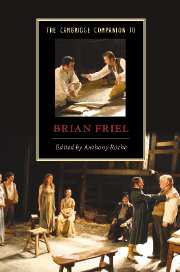Book contents
- Frontmatter
- 1 Introduction
- 2 The early plays
- 3 Surviving the 1960s: three plays by Brian Friel 1968-1971
- 4 Friel and the Northern Ireland “Troubles” play
- 5 Family affairs: Friel’s plays of the late 1970s
- 6 Five ways of looking at Faith Healer
- 7 Translations, the Field Day debate and the re-imagining of Irish identity
- 8 Dancing at Lughnasaand the unfinished revolution
- 9 The late plays
- 10 Friel’s Irish Russia
- 11 Friel and performance history
- 12 Friel’s dramaturgy: the visual dimension
- 13 Performativity, unruly bodies and gender in Brian Friel’s drama
- 14 Brian Friel as postcolonial playwright
- Bibliography
- Index
10 - Friel’s Irish Russia
Published online by Cambridge University Press: 28 January 2007
- Frontmatter
- 1 Introduction
- 2 The early plays
- 3 Surviving the 1960s: three plays by Brian Friel 1968-1971
- 4 Friel and the Northern Ireland “Troubles” play
- 5 Family affairs: Friel’s plays of the late 1970s
- 6 Five ways of looking at Faith Healer
- 7 Translations, the Field Day debate and the re-imagining of Irish identity
- 8 Dancing at Lughnasaand the unfinished revolution
- 9 The late plays
- 10 Friel’s Irish Russia
- 11 Friel and performance history
- 12 Friel’s dramaturgy: the visual dimension
- 13 Performativity, unruly bodies and gender in Brian Friel’s drama
- 14 Brian Friel as postcolonial playwright
- Bibliography
- Index
Summary
Graham Greene once wrote that “[t]here are writers - Tolstoy and Henry James to name two - whom we hold in awe, writers - Turgenev and Chekhov - for whom we feel a personal affection, other writers whom we respect. . . . [R. K.] Narayan more than any of them wakes in me a spring of gratitude, for he has offered me a second home.” Brian Friel's plays offer a “second home” to those of his audience for whom he holds up a mirror to their secret and perhaps unknown places. This is also the place where he meets Turgenev and Chekhov, where the “personal affection” and “gratitude” that emanate from his audiences are enhanced by his astute and intimate association with the Russians over a period of forty years.
In 1999 Friel wrote of his affinity with nineteenth-century Russia:
Maybe because the characters in the plays behave as if their old certainties were as sustaining as ever – even though they know in their hearts that their society is in melt-down and the future has neither a welcome nor even an accommodation for them. Maybe a bit like people of my own generation in Ireland today. Or maybe I find those Russians sympathetic because they have no expectations whatever from love but still invest everything in it. Or maybe they attract me because they seem to expect that their problems will disappear if they talk about them – endlessly.
- Type
- Chapter
- Information
- The Cambridge Companion to Brian Friel , pp. 104 - 116Publisher: Cambridge University PressPrint publication year: 2006
- 4
- Cited by

